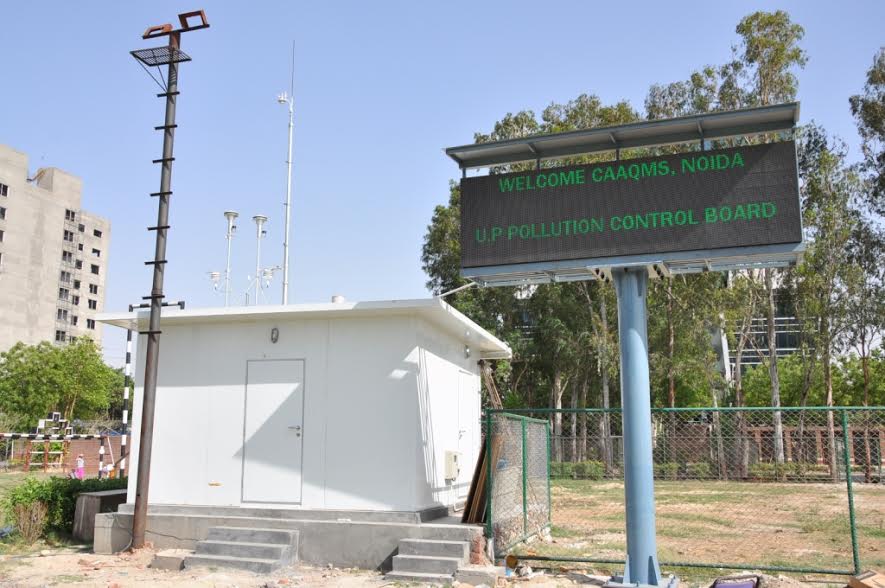Noida’s first ever “Continuous Ambient Air Quality Monitoring Station” (CAAQMS) Unit showcased at Amity University
Noida: “Continuous Ambient Air Quality Monitoring Station” (CAAQMS) unit, the first such system in the city installed by Ecotech, Australia in association with Envirotech, funded by Uttar Pradesh Pollution Control Board (UPPCB) was showcased today at Amity University Noida, Sector 125.
The automatic air ambient monitoring system provides real time air quality data based on 12 parameters, including particulate matter, NO2, SO2 and CO2 levels, and the air quality index. Noida has around 8,000 industrial units, six sewage treatment plants and hundreds of under-construction realty projects, which are major causes of pollution. Untill now, there was no facility to get real time automatic updates on air pollution as there were only two manual systems. This Unit will continuously display the pollution levels which will be shared with UPPCB. Also, the Unit will serve as Research for the students of Amity.
During the day, a workshop on “Air Pollution Sources and Mitigation Strategies” was organized by Amity Institute of Environmental Toxicology, Safety and Management (AIETSM) and Amity Institute of Environmental Science (AIES) in association with National Environmental Science Academy and University Campus, Noida.
The workshop witnessed the presence of eminent personalities including Dr. S.K. Goyal, Sr. Principal Scientist & Head, National Environmental Engineering Research Institute (NEERI), Narayana, Delhi; Dr. Anuradha Shukla, Chief Scientist, Central Road Research Institute (CRRI); Prof. A.L. Aggarwal, Emeritus Professor and Mr. S.K. Gupta, Chairperson, Envirotech Instruments Pvt. Ltd
Welcoming the gathering, Dr. Tanu Jindal, Director, Amity Institute of Environmental Toxicology, Safety and Management (AIETSM) said that with rise in pollution drastic climatic changes have occurred that are harming the environment. She apprised that some scientists have warned that humans might need another planet to survive in next 100 years, if the pollution level is not checked and controlled on time. Dr. Jindal further briefed about the research initiatives undertaken by Amity in the area of environment with special reference to air and water pollution.
Presenting a talk on “Air Pollution due to road transportation and its mitigation”, Dr. Anuradha Shukla stated that owing to rapid population growth and urbanization, there has been manifold increase in vehicles, which are one of the major contributors of air pollution. She outlined five major key challenges which are co-related including Increase in urban population, Industrialization, Increase in number of vehicles, Rise in air pollution and Adverse health effects. She averred that the concentration of vehicle related pollutants is typically 5 to 10 times higher than ambient air that causes severe health implications. She stressed that urban air pollution is the 13th largest cause of deaths worldwide and India’s worsening air pollution caused over 1.1 million premature deaths in 2015, as per a new study on global air pollution by the US-based Institutes. Dr. Shukla opined that the need of the hour to draft policies which focus on improving the efficiency of existing technologies, adoption of EURO IV standards, Penetration of Electric and Hybrid Vehicles and Traffic Light Synchronization. “A national approach highlighting key stakeholders with allocation of responsibilities, implementation, benchmarks and transport reporting are necessary towards establishing a structured and consistent air pollution monitoring system.” She said
Sharing his views on “Challenges in improving Quality of Air we breathe”, Dr. S K Goyal said that the air quality of Delhi has been severely declining from last 2 years due to many factors such as Industrial wastage, Vehicles, crop burning etc. which are contributing in aggravating air pollution. He shared that Delhi has 21 real time Ambient Air Quality Monitoring Equipment (AAQM) stations yet the data acquired is not sufficient and the state requires more stations with better data analysis techniques. Dr. Goyal pointed out that during Diwali, the PM 2.5 levels, which are very fine particulate matter that can be inhaled deep into the lungs, causing heart attacks, strokes, lung cancer and respiratory diseases, were monitored to be 12-13 times higher. He apprised the gathering about positive effect of clean air on human body and urged them to sync their lifestyle in tune with the nature as in this way, betterment of human health and environment can be ensured.
The day long Workshop witnessed informative talks on various topics by experts such as Dr. Manoranjan Hota, Director, MoEF; Dr. B.B. Awasthy, Regional Officer, UPPCB, Noida, Dr. M. P. George, Scientist-D, Delhi Pollution Control Committee; Dr. Nicholas, MD, Ecotech, Australia on “The increasing risk of environmental audit in India”; Prof. A.L. Aggarwal, Emeritus Professor on “Mitigations Strategies on Industrial Air Pollution Control : A case study of thermal power plant ” and others.

